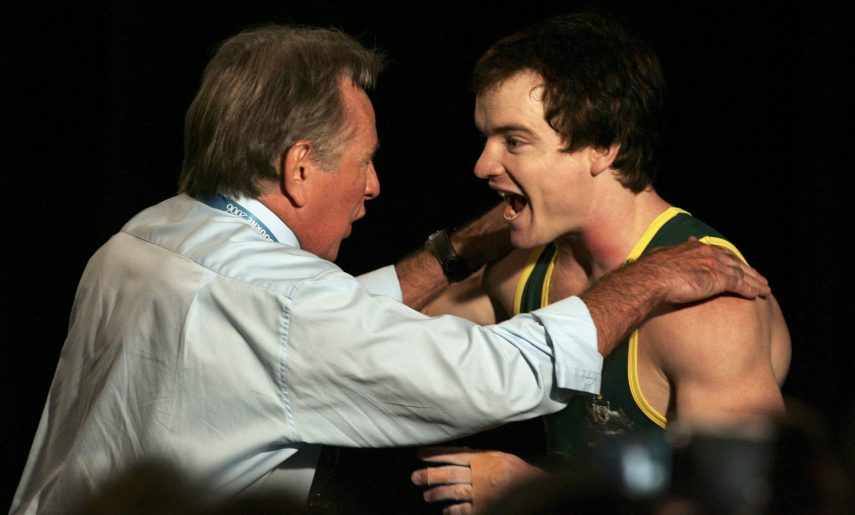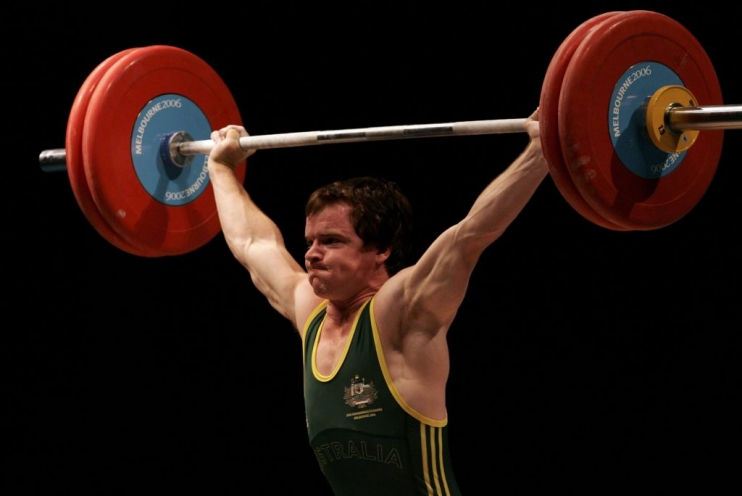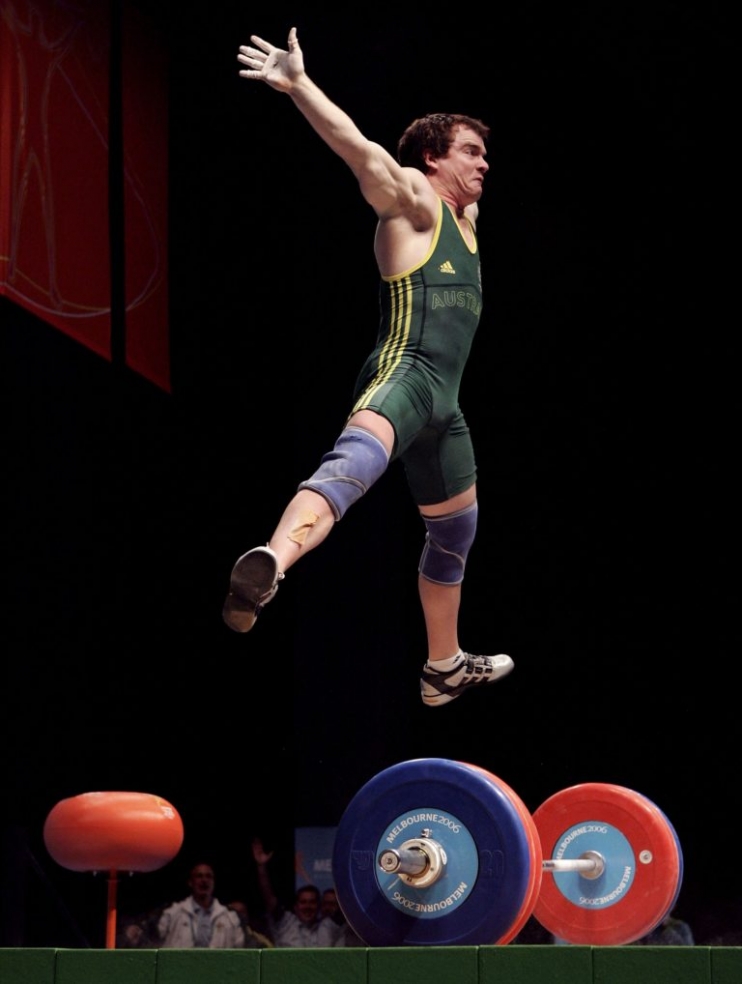
In this edition of Home Games History, David McPherson talks to the 69kg division men’s weightlifting gold medalist from the Melbourne 2006 Commonwealth Games.
Ben Turner had just won Commonwealth gold, and as is common with athletes who have just achieved greatness, he was overcome with emotion.
Turner’s tears weren’t typical athlete tears however, instead an outpouring of emotion stemming from a tumultuous 2006 Melbourne Commonwealth Games lead-up.
In the media area following the event, he gave a small insight into his struggles.
“This one is for my old man, I love you Dad,” he said.

A few months before the Games, Turner’s father was admitted to hospital after suffering a stroke.
“He was in hospital for about three weeks and we really weren’t sure what the outcome was going to be. So it was probably very much dedicated to him and his recovery and the support he gave me,” Turner said.
The Queenslander admits that both his and his father’s health significantly impacted his Games lead-up.
“From about nine months out from the Games I’d been struggling with some really horrific knee problems. That was giving me a lot of psychological and physical grief going into the event because I just didn’t know what was going to happen or how much I could train,” he said.
“It was really quite demoralising because during the process I watched myself go gradually backwards. Because my knees had so many problems my leg strength was just gradually deteriorating.”
With his dad in hospital and his strength waning, Turner went from an unbackable event favourite and top-ranked Commonwealth lifter, to an athlete doubting his readiness to take out the gold.
“Due to the fact that I was struggling with injury it was more going to be along the lines of I know I’m in the mix and it’s just going to be a matter of what happens on the day,” he says.
Turner’s rotten run with injury didn’t stop once the Games began either.
On just his second attempt at the snatch, Turner pulled the weight off the floor to begin the lift and ripped a callus from his hand in the process. Needless to say the attempt was unsuccessful.
“I went backstage, I pulled the skin off and it was bleeding profusely. I had a team doctor there clean me up in 30 seconds, wrap some tape around my hand and I was ready to go again,” he said.
“The sorest part of when you rip a callus is probably the initial feeling of actually doing it. The skin underneath is quite tender but if you tape it up you remove the sensation of actually touching that sensitive skin.”
Turner says such a mishap has the potential to derail a meet.
“I think maybe it would have affected someone with less experience more. I just knew I had to get this hand taped up and I’ve got to go out again and lift it properly this time. I’ve got one opportunity to do this and if it doesn’t come off I might never get it again.”
Following the snatch, Turner was in third position but not perturbed.

“The snatch is always my weaker component of the two. I felt that if I was pretty on par with the other lifters I’d be in pretty good shape.”
With three lifts to come in the clean and jerk, Turner’s coach set about putting Turner in a medal position.
He locked in the bronze with a lift of 158kg on the first attempt, and silver with 161kg on the second.
With Turner set to complete his final lift and Malaysian lifter Muhammad Hidayat still with one attempt remaining, the Australian had to climb into gold medal position and also set the mark high enough so he didn’t get chased down.
Turner’s coach set the lift at 166kg, a mark well short of the then 22-year-old’s own 171kg personal best but a decision he recognises now as critical to him winning the gold.
“I was saying to my coach, hang on, why put me up relatively light when I’m probably capable of a lot more.”
“Fortunately the result went our way on the day and I think it came down to his good tactics more than anything else.”
The final lift is a moment Turner won’t be forgetting anytime soon.
“The home crowd was absolutely euphoric in support of me. I remember hearing them scream as I jumped up the stairs and that sort of thing.”
“I put my hands on the bar and they were tremoring. I don’t know if it was because I was absolutely jacked with adrenaline or just knowing it was the biggest lift of my life.”
The biggest lift of his life didn’t end in disappointment, as he made the lift before dropping the weight and immediately springing into the air in celebration.

Turner’s fate was still in the hands of the Malaysian lifter, but with his lift complete the Australian knew his exhausting Commonwealth Games campaign was finally over.
“It all just came out sort of physically and emotionally. I did a bit of a celebration jump and the weight of the world came off my shoulders,” he says.
A nervous wait was still to come however.
“Once you finish your lift you go off into a media zone off to the side of the stage. I delayed that part and was leaning on a barricade because I was sort of gassed and I just watched up to the right as the lift happened.”
“I watched him clean the weight which was really straight forward, then I saw him jerk the weight very forward and as soon as I saw him jerk it I was like I’ve got this.”
And he did. Hidayat was unsuccessful and Turner was champion of the Commonwealth.
“Not even thinking I just assumed that was the end of the competition, I just bolted back up on stage. I was just celebrating with the crowd giving the big fist pump and that sort of thing.
Unknown to Turner, the meet hadn’t quite come to an end.
“There was a Fijian lifter who wasn’t even in medal contention, he still had one lift left,” he says with a laugh.
“After about ten or fifteen seconds I’d been ushered off, under normal circumstances it’s almost grounds for a disqualification.”
Luckily for Turner he wasn’t disqualified, because he would never have been able to make that dedication to his Dad.
Some 11 years later, there is someone he’d like to add to that post-lift thank you.
“Even though it was probably primarily at that stage focused on my Dad, thinking back now it’s something I’d probably very much dedicate to both my parents who were such a huge support for me throughout that stage of my lifting career,” he says.


